Clingendael Academy is one of the world’s largest independent, diplomatic academies. 2015 was for Clingendael Academy a year of growth, new opportunities, and consolidation. It was the most successful and fruitful year to date.
We once again expanded our diplomatic training with new projects for diplomats from Latin America and the Caribbean, West-Africa and the Sahel, and East-Africa. We started in earnest with our new facility, Negotiation Training as a Conflict Resolution Instrument, in which we organised 20 different training projects for groups in conflict and mediation. We trained almost 700 Dutch civil servants in preparation of the turn of the Netherlands in the seat of the rotating presidency of the EU in the first semester of 2016. We saw new partners for training such as ECOWAS, the National Postcode Lottery (Nationale Postcode Loterij), and the Emirates Diplomatic Academy, while renewing contracts, for example with the Netherlands Ministry of Defense for training Dutch military officers. Our open subscription courses saw a strong increase in participants with especially the International Security Course and the Course on International Relations performing well. We expanded on a more diversified portfolio by continuing to add training in international environmental issues, water diplomacy, trade diplomacy, and cyber security. Innovation continued at a relentless pace, adding new training approaches and methodologies, expanding our capacity to develop and design in-house simulation exercises and case studies, and to be able to train on all diplomatic skills. The Academy was engaged more extensively in international networking, by organising meetings with foreign diplomatic academies, alumni activities, incoming diplomatic visits, supporting young Dutch professionals in orientating towards an international career, and actively participating in international diplomatic networks.
Some 2015 Facts and Figures
In 2015 Clingendael Academy:
trained about 650 diplomats from 45 countries at its premises in The Hague.
trained a record number of 41 starting diplomats from the Netherlands in two different training courses.
trained hundreds of diplomats on location in Indonesia, South-Africa, Costa Rica, Malaysia, Georgia, Kosovo, Tunisia, Palestine, Belgium, and the United Arab Emirates.
conducted 51 diplomatic training projects.
trained about 2500 other professionals in 48 projects, including almost 700 Dutch civil servants for the EU rotating presidency.
continued its cooperation with Indonesia since 2003, and with South Africa since 1993.
trained one-third of the Pakistan diplomatic service.
trained about 350 diplomats and other civil servants from Arab countries in 10 different training programmes.
continued as a training partner with the Dutch Ministry of Defense since 1983, and in 2015 saw the contract renewed for another four years.
trained different Syrian groups in negotiation skills, including the Syrian Women Initiative.
trained Women African Mediators both in South Africa and in a two-week programme in The Hague.
celebrated the 70th edition of the Leergang Buitenlandse Betrekkingen (Course on Foreign Relations/ LBB).
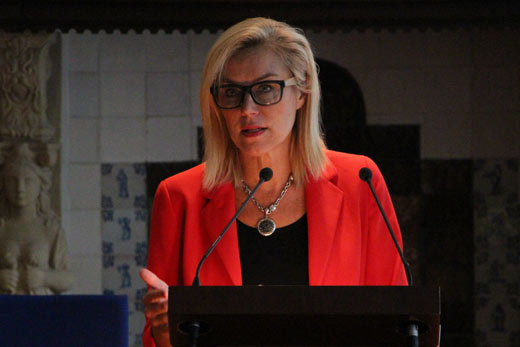
© Clingendael
UN Special Coordinator for Lebanon Sigrid Kaag presenting the opening address on the occasion of the 70th course on Foreign Relations (LBB).
The training at Clingendael normally lasts between one week and three months. On location, the sessions are between two and five days. The average evaluation score on the question, “How would you value the course as a whole?” is a 4.2 on a scale of 1–5.
Diplomatic Training
To be effective, professionals involved in diplomacy need to: Build and maintain knowledge of the issues on which they are working; have insight into the institutional environment of diplomacy and the broader international context; and finally, have a set of practical skills. These range from international policy analysis, to international policy coordination, to effective international communication.
Clingendael diplomatic training begins with the daily practice of individual participants and determines their training needs from there. Diplomatic training is for: Young professionals starting out – or with only a few years of experience – in diplomacy; mid-career professionals taking on new responsibilities in policy coordination within their organisation, as well as with partners; and senior diplomats who work on strategic policy-making and policy communication, develop scenarios, manage missions, and participate in international public debates on behalf of their country. Each diplomat possesses and requires a different skill set. Our training programmes are targeted and structured accordingly.
A selection of Diplomatic Courses for Young Professionals
Clingendael Academy organised the following courses for young professionals in diplomacy:
We started new regional diplomatic training programmes for diplomats from Latin America and the Caribbean, and East-Africa.
Latin America and the Caribbean
Diplomats from Colombia, Costa Rica, Cuba, the Dominican Republic, Guatemala, and Trinidad and Tobago came to The Hague to participate in a four-week training programme called ‘Enabling Closer Cooperation.’
East Africa
Clingendael Academy received a diverse and broad group of junior diplomats from Eastern Africa. The participants came from Rwanda, South Africa, Eritrea, Ethiopia, Kenya, Mauritius, Burundi, Seychelles, Tanzania, Uganda, and Somalia, as well as representatives of regional organizations like East African Community (EAC), African Union (AU), and the Inter-governmental Authority on Development (IGAD). In addition to lectures on themes such as cyber diplomacy, trends in international security, and developments in international political economics, substantial attention was devoted to diplomatic skills. In particular, negotiation, presentation skills, and policy briefing were addressed.
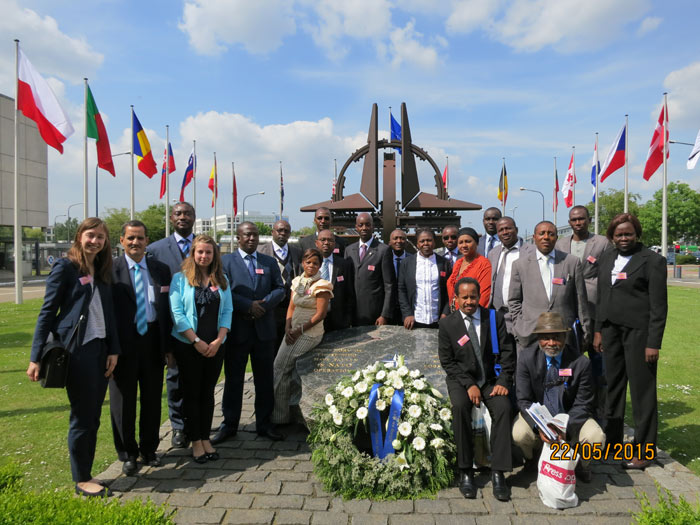
© Clingendael
Participants of the course for midcareer diplomats from West Africa and the Sahel during their visit to NATO in Brussels.
Continuation of Existing Programmes
In an intensive three-month training programme, participants in the ‘Klasje‘ commit to preparing themselves for their new job at the Netherlands Ministry of Foreign Affairs (MFA). In 2015, once again, a group of 26 – 20 from the MFA and six from other ministries – engaged in this programme. In addition to the regular course, we also trained civil servants with a few years of experience at the MFA and other ministries in a month-long crash course on diplomacy. We also trained junior-level diplomats from the countries of South-Eastern Europe, Southern Caucasus, North Africa and the Middle East (2x), Palestinian Territories, Indonesia, Bangladesh and Pakistan, Central America and the Carribean, West-Africa, and East-Africa.
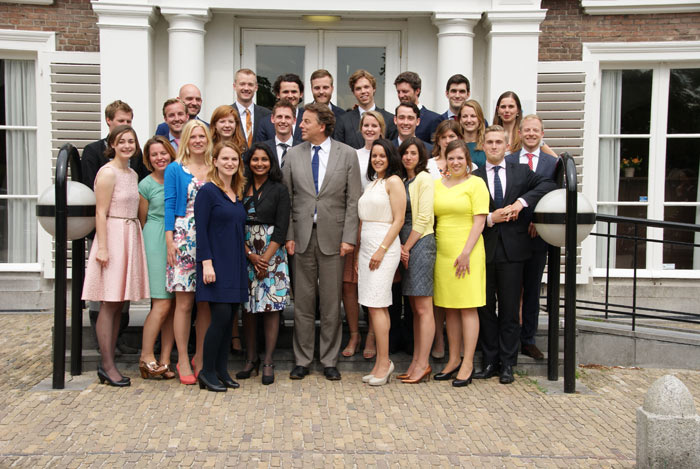
© Clingendael
Dutch junior diplomats with Foreign Minister Bert Koenders (front row, centre).
Programmes for Mid-career Diplomats
Where the programmes for starting diplomats tend to focus on the basic elements and processes of working in foreign policy, our programmes for mid-career tend to focus on specific themes, such as:
West Africa and the Sahel
Diplomats from Burkina Faso, Chad, Côte d’Ivoire, Ghana, Mali, Mauritania, Niger, Nigeria, and Senegal, together with a representative from the Economic Community of West African States (ECOWAS), participated in a four-week training programme called ‘Regional Cooperation, Peace, and Stability in West Africa and the Sahel.’ One of the main topics of this bilingual training programme was the utility of regional cooperation processes with regard to peace and stability.
Policy Coordination for diplomats from Indonesia and a programme for ASEAN (with diplomats from Brunei, Cambodia, Indonesia, Laos, Malaysia, Myanmar, the Philippines, Singapore, Thailand, Vietnam, and the ASEAN Secretariat).
Strategic Policy Planning and Strategic Policy Communication for Afghanistan and ECOWAS.
Specialised Diplomatic Training: ‘How to coperate with Brussels’ and ‘Trade and Economic Diplomacy’ for civil servants from the MENA region); ‘Blue diplomacy‘ for diplomats from South Africa; ‘Energy Diplomacy and development of natural resources’ (for Mozambique in cooperation with Clingendael International Energy Programme); ‘Water Diplomacy’ (for diplomats from North Africa and the Middle East, including countries with ongoing regional water disputes); ‘Agricultural Diplomacy‘ (for the Dutch Ministry of Economic Affairs’ DG on Agriculture) and ‘Cyber Diplomacy‘ (as a side event of the Global Conference on CyberSpace).
Programmes for Senior Diplomats
Training for senior diplomats is much more focused on advanced skills training, reflection sessions, learning from one another, leadership skills, and management. Two examples of senior programmes that ran in 2015 were Indonesia and Kosovo.
Capacity building in Diplomatic Training and International Affairs
In capacity building, we share Clingendael Academy’s educational and management approach in coaching trainers and tutors to appreciate different ways of learning, to introduce interactive elements to their classes, and to explore integrated training as an attractive and often highly effective alternative. Focal points include: Designing and using interactive exercises; curriculum development; and institutional development. In 2015, we did capacity building for: The Foreign Service Academies of Bangladesh and Pakistan; MFAs and Diplomatic Training Centres of Central Asian Republics and Mongolia; The Centre for Education and Training of the Ministry of Foreign Affairs of Indonesia; The Training Department of the Department of International Relations and Cooperation of South Africa (DIRCO); The Bulgarian Diplomatic Institute (BDI);the Diplomatic Academy of Kosovo; Tunisia Diplomatic Institute for Training and Studies; the Georgian Centre for Diplomatic Training ‘Levan Mikeladze’; The European Fund For the Balkans; and the Diplomatic Academy of Costa Rica.
We have had the privilege to cooperate with the Clingendael Institute for more than 13 years. Over 1500 Bulgarian civil servants were successfully trained in the field of communication and negotiation skills, energy, security and diplomacy. During 2015 Clingendael made the first contribution to the Preparation for the Bulgarian Presidency of the Council of the European Union with one of the pilot trainings in the programme. Over 30 participants acquired advanced negotiation techniques through simulations and interactive lectures.
Tanya Mihaylova, Director Diplomatic Institute, Ministry of Foreign Affairs Republic of Bulgaria.
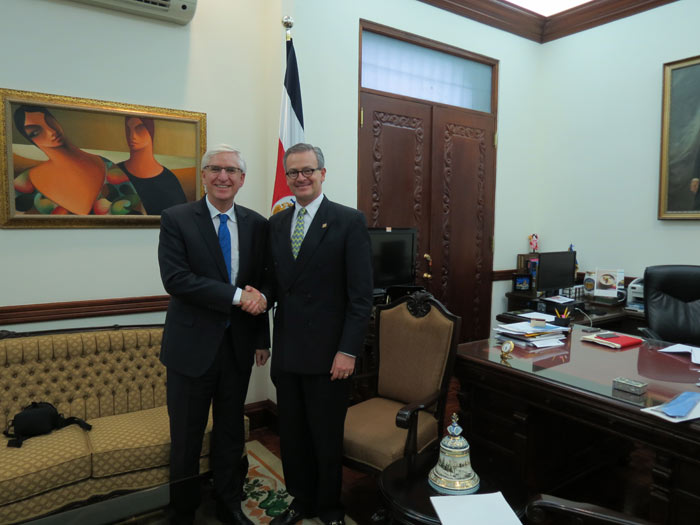
© MFA Costa Rica
Director of Clingendael Academy Ron Ton with Mr. Manuel Gonzales Sanz, Foreign Minister of Costa Rica.
Three highlights were:
Capacity Building for Representatives From Malian NGOs
2015 saw the launch of a new type of capacity-building programme, aiming at enhancing the professional skills of representatives from Malian NGOs. This two-week training was made possible thanks to the support of the Nationale Postcode Loterij.
Capacity Building for the International Law Department of the Padjajaran University of Bandung (Indonesia)
Clingendael Academy also provided a two-week course in international issues and train-the-trainers techniques in cooperation with Maastricht University for a group of 20 lecturers from the University of Padjadjaran (Bandung). This programme was organised in the framework of a NUFFIC niche project, which was won by a consortium comprising Clingendael Academy, Maastricht University, and CINOP Global.
Capacity Building for Vietnamese Civil Servants
Vietnamese civil servants and military personnel working on the UN Convention Against Torture (UNCAT) attended a one-week training course on how to report on the Convention at Clingendael Academy. This training was organised with the support of the Dutch embassy in Hanoi.
International Skills Training
Clingendael Academy provides courses in all diplomatic skills, including negotiation, intercultural communication, presentation skills, and effective influencing. Skills training is part of all of Clingendael Academy’s training courses and the Academy’s staff delivered hundreds of sessions throughout the year.
Clingendael Academy staff members are increasingly involved in stand-alone training sessions focusing specifically on one or two skills. In 2015, Clingendael Academy staff conducted roughly 80 training sessions in diplomatic skills, not including training in other Clingendael courses. Highlights included the training conducted within the European Diplomatic Programme (EDP), effective communication workshops for the Syrian opposition (SOC), negotiation training in the IPSI Summer Symposium for Conflict Resolution and the training for Malaysian officials. We also conducted several intercultural-communication training sessions in-company for the private sector.
Negotiation Training as a Conflict-resolution Instrument
Clingendael Academy and the Dutch MFA established a facility for training groups that are involved in conflicts and their mediators in negotiation skills and processes. The facility started with one activity in November 2014. In 2015, it expanded quickly with 20 training projects for among others African Women Mediators, the technical gender committee of Cyprus, Syrian Women Initiative and ECOWAS Mediation Support and Council of the Wise. Work was also done together with the UNDP, the UN Mediation Support Unit, and the Centre for Humanitarian Dialogue.
The HD Centre partnered with Clingendael on a number of trainings on negotiation skills. These trainings involved conflict parties or peace process actors in difficult and sensitive political settings. Our Clingendael Academy partners demonstrated great professionalism in managing these trainings as well as sensitivity regarding the issues at stake. The parties receiving the trainings acquired useful skills and expressed appreciation for the trainings. The Clingendael Academy has proven to be a reliable partner and we look forward to continuing our collaboration.
Dr Katia Papagianni, Director Policy and Mediation Support, Centre for Humanitarian Dialogue (Geneva)
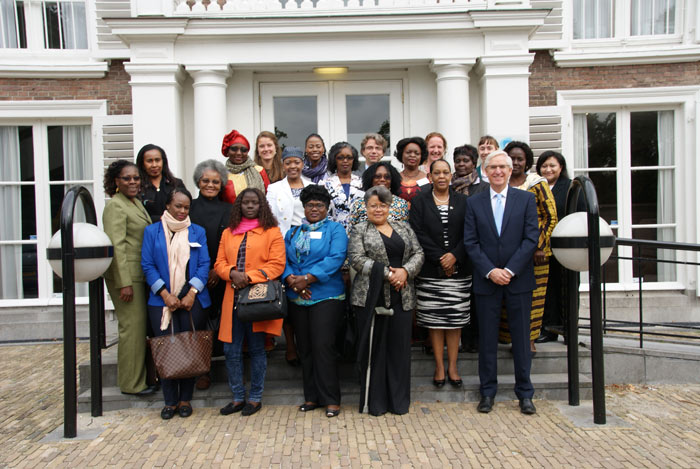
© Clingendael
African Women Mediators posing on the steps of Huys Clingendael.
EU and European Integration Training
Clingendael training courses on the EU are a combination of content, skills, and work processes. We train about the policy cycle of the EU, where and how to influence effectively, and on ‘Brusselisation,’ meaning the Brussels’ working culture. Highlights of Clingendael Academy’s EU training in 2015 included: ‘How to Cooperate with Brussels,’ this time for 25 civil servants from North Africa and the Arab region (involving the MATRA-South countries of Morocco, Tunisia, Libya, Egypt and Jordan); ‘Regional Policy Instruments of the EU’ for the Dutch Ministry of Foreign Affairs; and a comprehensive EU training package designed for the Flemish government. Clingendael Academy also won a new framework contract with the Dutch governments to train Dutch civil servants on general EU affairs.
Together with the Centre for European Negotiation and Decision-making (CENAD), Clingendael Academy implemented a training programme to support Dutch civil servants to prepare them for their turn in the rotating presidency seat of the European Union in early 2016. The programme consisted of four modules: General understanding of the EU; strategy and negotiation as the chair; working the EP and chairing skills; and module four was fully focused on negotiations with the EP and was developed for senior management of the Dutch government. In total, 689 civil servants participated in the programme. Also, together with CENAD, Clingendael Academy trained Slovakian civil servants for the rotating presidency of the EU. Slovakia is in the rotating chair after the Netherlands.
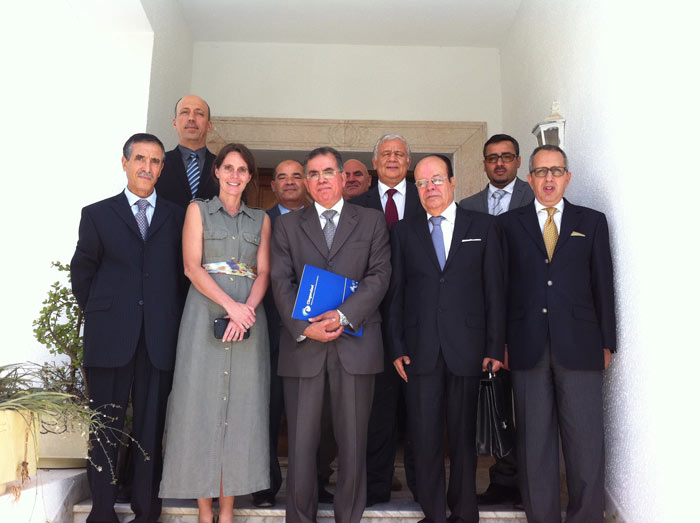
© Matra
Clingendael’s Training and Research Fellow Marianne Rogier-Ducasse in Tunisia.
International Security and Conflict Issues
The strategic choice to focus the training courses in international security more on the work processes and contexts of our partners paid off. Combined with a skills component and even greater attention to current unfolding affairs resulted in well-evaluated programmes, high attendance to our open registration courses, and increased interest in tailor-made programmes in 2016.
The international footprint of the security courses also increased further, for example, with the English-language CIV attracting participants from all over the world. We also conducted a workshop for the Lebanese army as a subcontracted partner in relation to an NL Embassy project on civil-military cooperation. Of particular note is the pre-deployment training organised for a crisis-management mission in the context of the European Commission-financed ENTRi project. Clingendael and its Belgian partner, the Egmont Institute, implemented two francophone pre-deployment training courses for civilian staff deploying to Mali and Niger for the UN and the EU (over fifty civilian experts). For the same target group, we also have an ENTRi course on negotiation and mediation.
Other highlights included the training course in ‘International Crisis Management’ for the Dutch Defence Academy’s Advanced Staff and Command Course for which the contract was renewed for another four years; a week-long course for ECOWAS‘ Early Warning Directorate in scenario planning and policy making; the international orientation course for the NL Police ‘Columbus’, the pre-deployment training for Dutch military observers deploying to UNTSO; and finally the organisation of a two-day conference on interoperability in civilian and police training for crisis management missions.
Open Enrolment Courses and Other Activities
Parts of the Diplomatic, European, Security and Skills programmes at Clingendael Academy are open to individual, open subscription. One of the Academy’s flagships, the course on foreign affairs (‘Leergang Buitenlandse Betrekkingen/LBB’), was organised for the 70th time since 1967. The course lasts for three months and is open to Dutch professionals preparing or retraining for an international career. The course was very successful and had its maximum number of participants. The other highlight was the performance of the two international-security courses which were also fully booked; Seminar International Negotiation, and International Mediation and Consensus Building.
